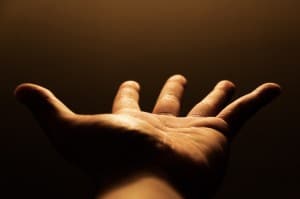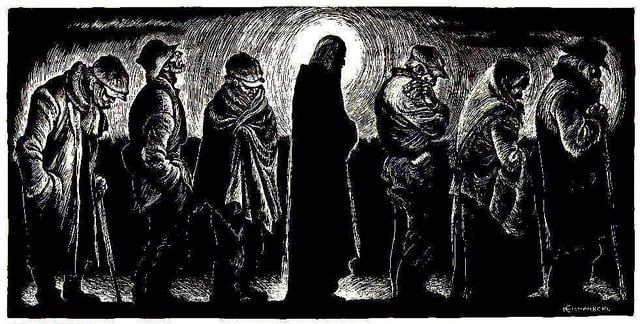
Reaching out in generosity…
If you’ve ever tried to relight a cigarette you know the tar-bitter taste of an old smoke. If you’ve ever pulled a butt out of an ashtray having realized that your last pack was empty you also know the nagging perversion of addiction. In a really desperate moment you may have found one on a curb somewhere and ‘good enough for you’ might have become ‘mostly dry and without too much lipstick on the filter.’ Trust me, this is not the kind of ‘cool’ the Marlboro Man promised but rather a reminder that you’re never too cool to be addicted.
When I was in graduate studies in Chicago I was privileged to work with the the Ignatian Spirituality Project (ISP), a program that offers overnight retreats to homeless men and women in addiction recovery programs. Many of the men on these retreats were committed smokers and many were in the habit of rationing their cigarettes such that their clothes smelled not only of smoke but of tar and ash, a musty scent generally reserved for the poor and the desperate.
Scent and memory are linked. Seasonally speaking (in both scent and memory) fall is my favorite – familiar foods in the kitchen, a warm drink by a fireplace, the scent of cinnamon or nutmeg and pumpkin, everywhere pumpkin. Here in Madrid the old familiar scents of fall are foreign. Others, though not exactly new, abound.
Smoking has yet to fall out of fashion here and this scent (more than triggering my old cravings) reminds me of my time with ISP which, in turn, reminds me of thanksgiving. In that ministry I was grateful and from those men I learned much about gratitude. It’s safe to say that I learned more about thanksgiving from those half-smoked cigarettes than from all the turkey and stuffing a grown man can take.
***
When the Stranger says: “What is the meaning of this city?
Do you huddle close together because you love each other?”
What will you answer? “We all dwell together
To make money from each other”? or “This is a community”?
His damp coat smelled of half-smoked cigarettes. The smoke breaks were short by necessity. The Chicago air was often painfully cold and cigarettes were expensive. These men smoked their harsh generic-brands like diabetics – constantly and in small doses. Behind their ears and in their pockets hid a precious collection – small stubs of solace that in other contexts would be condemned to an ashtray or dustbin. I suppose value is a relative thing.
We made small talk on the porch of the retreat house. Where you from? How’d you end up in Chicago? How about this weather? People everywhere talk about the weather but not until I lived through a Chicago winter did I understand that this is actually something worth talking about. Weather in L.A. is a back-drop. Weather in Chicago is a threat.
He told me he was originally from the south, Mississippi I think, but his family, like many others, moved to Chicago in the middle part of the last century, the part when Mississippi was burning black churches and children. The part when many lived in fear because an oppressed few decided to live in dignity. Sometimes it seems that those days weren’t that different than these days. In any case, it was a good time to move and Chicago has always been a city of migrants, stockyards, and train tracks. A city once burned and oft ignited. An immigrant city of story and struggle. A damp city full of relit smokes.
“I actually like the winter,” he said. “It brings us close. Ain’t nobody lookin’ to impress in the kinda coat you need here in the winter. And people look out for each other. Like if you got an ol’ neighbor next door and a storm comes through, you dig out their walk and you make sure they got what they need.” I had the impression he was thinking of someone in particular. His watery eyes were set on a vague point in the near distance. “People are nicer to each other when it gets cold.” He paused and took another draw off of his cigarette. “Or at least they used to be.”
***
Oh my soul, be prepared for the coming of the Stranger.
Be prepared for him who knows how to ask questions.
We used to be grateful. At least that’s what we commemorate on this Thanksgiving holiday. We remember (and hope to reenact) a historic moment of gratitude before the coming of a long winter. That’s a bold thing to do, to give thanks before the winter, to adopt a posture of gratitude as the world around turns everything into the ground again, to celebrate abundance when all evidence points to growing scarcity. It’s a bold thing to do and difficult.
We’re all too often angry, disappointed, or bitter. At times it seems we’ve traded gratitude for entitlement, generosity for greed, prosperity and justice for power and privilege. We’re all guilty here. We haven’t treated each other well. We haven’t presumed the good in the other. We’ve forgotten the gift we are to one another. We look upon each other with suspicion. We seem, nervous, wary, and afraid.
Does the cold bring us close? Does crisis inspire community? Are we nicer to each other when things get tough? It’s hard to say sometimes. In our politics we rant, we hate, we tear down and attack, we refuse to cooperate, even to participate. In our church we divide, we exclude, we judge. In our daily lives, we ignore, we pass by, we dismiss and deny. Year after year on the so-called Black Friday we mob and we claw and we threaten and we grab. Like a wounded beast backed into a corner we snarl and we snap. Is this the way we want to be? Is there another?
***
There is one who remembers the way to your door:
Life you may evade, but Death you shall not.
You shall not deny the Stranger.
– Choruses from The Rock, T.S. Eliot
If the church is to be anything it should be a place of thanksgiving and generosity, a place of bold risks and patient trust. We are to forgive without exception, to love without condition, to live without fear. We are to head out into the storm in a ship too small, in a world too cruel. In the audacity of love we are to leave behind the certainty, the comfort, the privileged assurances that we won’t lose everything. We are to be grateful before the gifts are given. We are to give thanks before the cold sets in.
To do this we must overcome a perpetual crisis of character – a crisis of maturity. We must turn our adolescent self into a generous giver. In thanksgiving we acknowledge what we’ve received in gratitude even as we prepare to lose everything in love. To do this we must learn one of the most fundamental truths of this life: that we’re not here to get what we want but rather to give what we have.
We are invited this week to enter the darkest part of the year in gratitude. In these cold days we must remind ourselves of the good things, the essential things, the things we can’t merit or earn. We must remember the gifts. We must turn to one another. We must welcome the stranger and love the enemy. We must share that for which we are most grateful.
We must do this because thanksgiving can’t exist without generosity. Thanksgiving can’t exist unless we’re willing to accept that all we have was given and unless we’re willing to give it all again. Thanksgiving is not a reward for the wealthy nor the privilege of the prosperous. Thanksgiving is a habit of the humble and generosity is a gift of the truly grateful.
– // –


